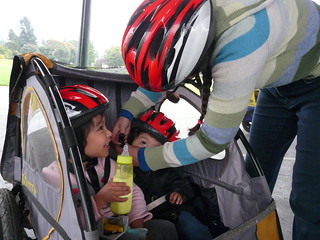
en Cully ride, organized at Hacienda CDC.
(Photo: Community Cycling Center.)
As bikes become a bigger part of normal life for people at Hacienda CDC in Northeast Portland’s Cully neighborhood, there’s a shortage of something that holiday charity bike drives seldom offer: bike trailers.
It started when a group of residents at the low-income housing community decided to join the Northeast Portland Sunday Parkways event last June. The Community Cycling Center (which works with Hacienda residents on several projects) arranged to loan bike trailers to a couple moms who wanted to bring their children.
“The women just loved it — they didn’t even realize that was an option,” CCC spokeswoman Melinda Musser said Tuesday. “Normally when they go on bike rides, the women who have kids, they have to have another adult to watch them. So that was an obstacle that they maybe didn’t even realize. … Once they started using the trailers they got really excited. They realized that they could ride more often and bring their kids with them.”
“They’re expensive, but folks really want to take kids out with them while bike riding. There’s got to be somebody out there making a low-cost trailer that’s going to be acceptable to a low-income person.”
— Tony DeFalco, Living Cully
“They’re expensive, but folks really want to take kids out with them while bike riding,” said Tony DeFalco of Living Cully, the neighborhood’s antipoverty-focused ecodistrict. “There’s got to be somebody out there making a low-cost trailer that’s going to be acceptable to a low-income person.”
DeFalco is hoping to secure a trailer donation that his organization could use as a raffle giveaway. Gordon said Hacienda is weighing whether to give a trailer to one family or try storing it in a community space for public access.
Hacienda’s Anna Gordon, who coordinates bike activities at the Latino-targeted low-income housing community, agreed that there is “definitely high interest” in bike trailers among the group now. She said it’s one of several barriers to bike access for people in the community.
Another obstacle is Hacienda CDC’s own homes, which Gordon said don’t offer space to park a bike trailer. Other barriers include bike theft and a lack of knowledge by some riders of how to safely use the road.
“We see access to a sustainable practice like bike riding as something that most people in the neighborhood are aware of, but either don’t have access to a bike or don’t have access to the kind of places they want to go on a bike,” DeFalco said.
With an eye to improving access, Living Cully is partnering with the Portland Bureau of Transportation for a series of walks and rides, called Living Cully Walks, that will help people in the area learn the best routes around the neighborhood without a car while also helping the city understand weak links in local transportation networks.
Gordon said she likes the fact that bikes are integrating fully into the lives of the people she works with.
“It’s exciting — it’s a bigger picture around actually getting people access,” she said.

